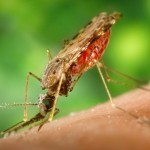
Malaria, the mosquito-borne parasitic disease, infected an estimated 198 million people in 2013 and killed over 500,000, according to the WHO. The majority of those victims were children under the age of five. Concerted efforts to fight this staggering effect by treating the disease with indoor residual spraying and insecticide-treated bed nets, as well as treatment with more effective drugs, have cut the African children s death rate by over 50 percent since 2000. And as we have previously reported, research continues on a variety of anti-malaria efforts. Yet beneficial as these measures have been, more can be done. The holy grail of malaria prevention has long been a vaccine a difficult prospect, since an effective vaccine against a parasitic disease has never been produced. But it seems that this may be changing, according to a new study just published in The Lancet.
This study was carried out by the RTS,S Clinical Trials Partnership, a consortium that includes several African and European countries. RTS,S/AS01 is the vaccine tested in this study. The vaccine is based on a genetically engineered protein, and more information may be found here. (Those opposed to the science of genetic engineering might want to pay attention here.)
The study, which was reported in The Lancet, involved treating two groups of children: one group between the ages of 5 and 17 months, and the other infants aged 6-12 weeks. The children were enrolled at 11 centers in seven countries in sub-Saharan Africa. Participants were randomly assigned to one of 3 protocols. One group received 3 doses of vaccine at months 0, 1, and 2, and a booster shot at month 20. A second group received the first three shots of RTS,S/AS01 as the first, but the 20-month booster shot was a different vaccine. Finally, the third group received only a different, non-malarial vaccine at each age. The primary point of this study was to determine the effectiveness of the booster injection at 20 months of age in extending the efficacy of the vaccine, since earlier work had indicated that the efficacy tends to wane over time.Of the 15,000 participants overall, nearly 9,000 children were in the 5-17 month age group and the rest in the younger group.
The investigators found that the vaccine prevented a substantial number of cases of clinical malaria whether or not a booster dose was included. The malarial vaccine efficacy (VE) compared to the control group (no malarial vaccine) was about 36 percent, while compared to the group that received only 3 shots of the vaccine it was about 1 percent. These results were for the children aged 5-17 months at study start. For the younger group, the VE was about 26 percent compared to the control group, while it was over 18 percent in the group receiving only 3 vaccine injections. There were some severe adverse effects in all groups receiving the malarial vaccine.
The authors concluded RTS,S/AS01 prevented a substantial number of cases of clinical malaria over a 3 4 year period in young infants and children when administered with or without a booster dose. Efficacy was enhanced by the administration of a booster dose in both age categories.
ACSH s Dr. Ruth Kava commented While this malaria vaccine is far from perfect, it seems to be on the right track. Clearly, the potential exists for an effective way to prevent this awful infection, and further reduce the horrific toll the disease takes on African children.


